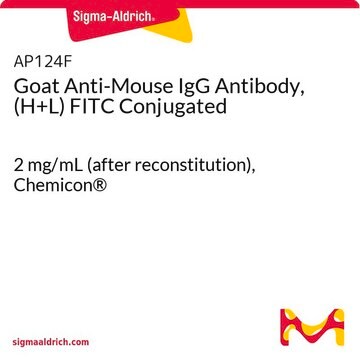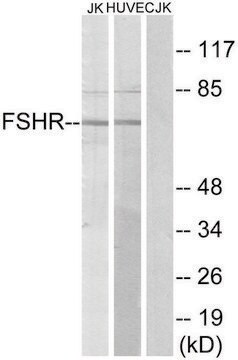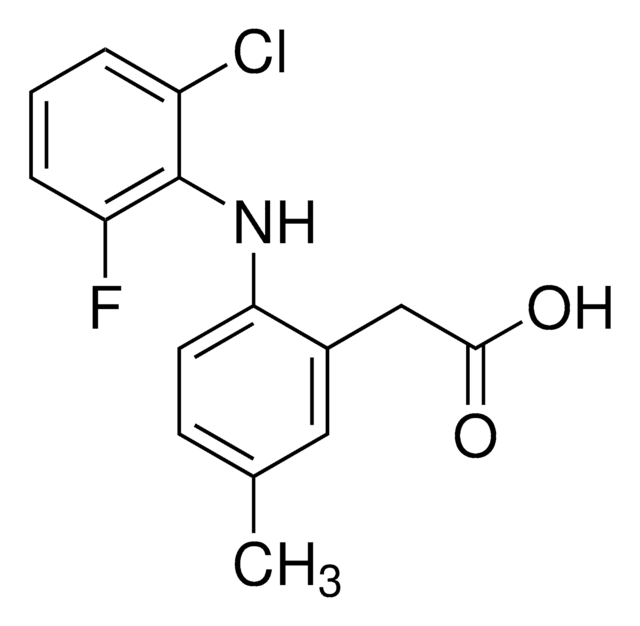MAB8257F
Anti-Influenza A Antibody, nucleoprotein, clone A1, FITC-conjugated
clone A1, Chemicon®, from mouse
Sign Into View Organizational & Contract Pricing
All Photos(1)
About This Item
UNSPSC Code:
12352203
eCl@ss:
32160702
NACRES:
NA.41
Recommended Products
biological source
mouse
Quality Level
conjugate
FITC conjugate
antibody form
purified antibody
antibody product type
primary antibodies
clone
A1, monoclonal
species reactivity
human
manufacturer/tradename
Chemicon®
technique(s)
immunofluorescence: suitable
isotype
IgG2a
shipped in
wet ice
Specificity
Specific for the Influenza A nucleoprotein. Has stronger binding with N1-type Flu A. No cross reactivity seen to influenza B or other respiratory viruses.
Immunogen
Epitope: nucleoprotein
Influenza A
Application
Indirect Immunofluorescence
Optimal dilutions must be determined by end user.
Optimal dilutions must be determined by end user.
Research Category
Infectious Diseases
Infectious Diseases
Research Sub Category
Infectious Diseases - Viral
Infectious Diseases - Viral
This Anti-Influenza A Antibody, nucleoprotein, clone A1, FITC-conjugated is validated for use in IF for the detection of Influenza A.
Physical form
Purified, FITC conjugated. Liquid in 0.02M phosphate buffer, 0.25M sodium chloride, pH 7.6 with 15 mg/mL BSA and 0.1% sodium azide
Storage and Stability
Store at 2° to 8°C.
Other Notes
Concentration: Please refer to the Certificate of Analysis for the lot-specific concentration.
Legal Information
CHEMICON is a registered trademark of Merck KGaA, Darmstadt, Germany
Disclaimer
Unless otherwise stated in our catalog or other company documentation accompanying the product(s), our products are intended for research use only and are not to be used for any other purpose, which includes but is not limited to, unauthorized commercial uses, in vitro diagnostic uses, ex vivo or in vivo therapeutic uses or any type of consumption or application to humans or animals.
Not finding the right product?
Try our Product Selector Tool.
Storage Class Code
12 - Non Combustible Liquids
WGK
WGK 2
Flash Point(F)
Not applicable
Flash Point(C)
Not applicable
Certificates of Analysis (COA)
Search for Certificates of Analysis (COA) by entering the products Lot/Batch Number. Lot and Batch Numbers can be found on a product’s label following the words ‘Lot’ or ‘Batch’.
Already Own This Product?
Find documentation for the products that you have recently purchased in the Document Library.
Cheng-Chung Lee et al.
Scientific reports, 9(1), 4546-4546 (2019-03-16)
Influenza is a contagious acute respiratory disease caused by the influenza virus infection. Hemagglutinin (HA) is an important target in the therapeutic treatment and diagnostic detection of the influenza virus. Influenza A virus encompasses several different HA subtypes with different
Katherine S Xue et al.
eLife, 5, e13974-e13974 (2016-03-16)
RNA viruses rapidly diversify into quasispecies of related genotypes. This genetic diversity has long been known to facilitate adaptation, but recent studies have suggested that cooperation between variants might also increase population fitness. Here, we demonstrate strong cooperation between two
Kamonthip Rungrojcharoenkit et al.
PloS one, 15(8), e0237218-e0237218 (2020-08-08)
Influenza is an infectious respiratory illness caused by influenza viruses. Despite yearly updates, the efficacy of influenza vaccines is significantly curtailed by the virus antigenic drift and antigenic shift. These constant changes to the influenza virus make-up also challenge the
Jenna M Kastenschmidt et al.
Immunity, 56(8), 1910-1926 (2023-07-22)
Highly effective vaccines elicit specific, robust, and durable adaptive immune responses. To advance informed vaccine design, it is critical that we understand the cellular dynamics underlying responses to different antigen formats. Here, we sought to understand how antigen-specific B and
David F Boyd et al.
Nature, 587(7834), 466-471 (2020-10-30)
Severe respiratory infections can result in acute respiratory distress syndrome (ARDS)1. There are no effective pharmacological therapies that have been shown to improve outcomes for patients with ARDS. Although the host inflammatory response limits spread of and eventually clears the
Our team of scientists has experience in all areas of research including Life Science, Material Science, Chemical Synthesis, Chromatography, Analytical and many others.
Contact Technical Service







